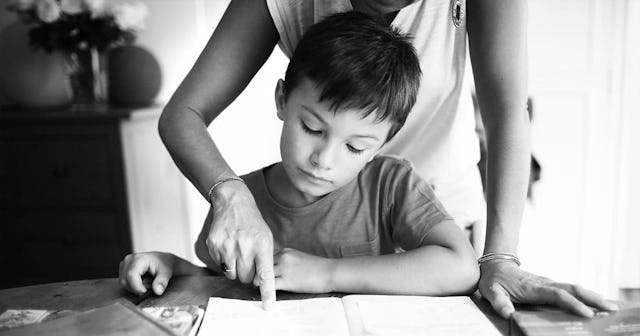Moms Are The 'She-Fault' Parent During This Pandemic

Efforts to slow the spread of the coronavirus have upended daily life for most Americans. Businesses are shuttering. Workers are losing hours and even jobs. Almost everyone who can work remotely is now working from home — and this includes children, as schools across the country close their doors.
With schools expected to stay closed for weeks or even months, parents are suddenly forced into homeschooling, often while also being asked to continue working their regular jobs. And the bulk of this homeschooling labor will fall to mothers.
The virus itself may not discriminate in whom it infects, but in a society with widespread gender inequality, the ripple effects will not hit every person equally. Parents are facing burdens that non-parents are not, and among those parents, mothers are likely to be the hardest hit.
Over three years, I researched homeschooling for my upcoming book, surveying over 600 homeschooling parents, interviewing 46 of them, and attending homeschooling conferences. I found that overwhelmingly, the labor of homeschooling falls to mothers.
Paco Navarro./Getty
Pay inequality played a central role in this imbalance: For many, dad had a better-paying job, so it made economic sense for mom to stay home. On top of this, many mothers felt they had greater aptitude for the day-to-day work involved in homeschooling. Some thought this was an innate difference, while others drew on the gendered social world of their own childhoods – the girls babysat for neighbors or helped care for younger siblings and cousins – to explain why they had skills that made them the far better candidate for the job of homeschooling.
Our cultural beliefs about motherhood are central to explaining why homeschooling is seen as women’s work. Sociologists have long argued that parenting in the United States (and elsewhere) is a gender-differentiated practice, where “mothering” and “fathering” are gender-specific practices. Despite women’s increased participation in the paid labor force over the past several decades, child-rearing is still largely understood as women’s work. Mothers tend to be held accountable for decisions that families make about child-rearing, including decisions about children’s education. If mothers are the ones held accountable for their children’s education, it makes sense that they disproportionately take on the labor associated with that education.
My research indicates that mothers will do the bulk of the work caring for and educating our nation’s children during our widespread coronavirus-related school closures. And not all mothers will be equally able to do so. Working moms may be forced to choose between being penalized for not prioritizing work, or scrutinized for not prioritizing their children. Some – those privileged with savings, the flexibility to work from home, or a spouse with job security – may have to reduce work hours or take unpaid leaves of absence. Low-income mothers, mothers of color and single mothers, who already face more scrutiny for their parenting, will be even harder hit. Those who cannot afford to take time off without risking their jobs will face even more intense stress and scrutiny, and their children will suffer — unnecessarily — as a result.
MoMo Productions/Getty
Americans seem to be gradually accepting the reality that school closures are necessary for combatting this pandemic. While this happening, we, as a nation, can take steps to lessen the burden on mothers. At a minimum, we need an emergency, national, paid time-off policy for all parents of children under 12. Members of Congress are debating various proposals to give cash to some or all Americans to offset the economic impact of the pandemic. These proposals are a good start, but they do not take into account the extra labor that some have taken on due to school closures.
Education is a public good that we support through taxpayer-funded public education. Our schools are not only spaces of learning, but of safety and supervision for young children. While schools are closed, we can continue to support the education of our children by paying those who are now providing for their education, safety and supervision – largely their mothers. Paying for this labor is one way that we can continue to invest in our children, while ensuring that families can stay afloat financially if work hours have to be reduced.
My greater hope is that when this is all over and schools across the country are back in session, we remember the many lessons about social inequality that this pandemic will inevitably teach us. One of these lessons will be about the burden placed on mothers when public services, like education, are stripped away. I hope that we will use this experience to advocate for improving our schools, as part of a larger push to improve the social infrastructure that could better support us through such national crises in the future.
This article was originally published on